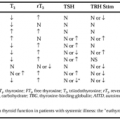SUPPURATIVE THYROIDITIS
Part of “CHAPTER 46 – THYROIDITIS“
ETIOLOGY
Suppurative thyroiditis, an uncommon but potentially serious disorder, is an acute, subacute, or chronic infection of the thyroid caused by either a bacterial or fungal infection. The organisms most commonly involved in acute suppurative thyroiditis include Staphylococcus aureus, Streptococcus hemolyticus, Escherichia coli, pneumococcus, and Salmonella sp.1 Bacteroides sp and other anaerobic bacteria may occasionally initiate this disorder.2 Acute inflammatory changes in the thyroid usually occur by direct hematogenous spread, either from a nearby infected tissue or from a distant site. Conversely, tuberculous or syphilitic involvement and fungal infection typically lead to a more chronic indolent process (see Chap. 213). Pneumocystis carinii has been documented as a cause of thyroid infection in patients with acquired immunodeficiency syndrome. In addition, cases of Coccidioides immitis thyroiditis have been reported in immune-suppressed patients in the context of disseminated coccidioidal disease.3 These findings suggest that patients infected with human immunodeficiency virus and other immune-compromised individuals may be predisposed to a variety of thyroid infections with more unusual, opportunistic organisms.
Stay updated, free articles. Join our Telegram channel

Full access? Get Clinical Tree






